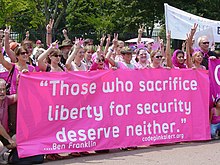Code Pink

Code Pink activists demonstrate in front of the White House on July 4, 2006.
|
|
| Formation | November 17, 2002 |
|---|---|
| Type | NGO |
| Purpose | Anti-war, Social justice |
|
Key people
|
Jodie Evans, Medea Benjamin |
| Website | www |
Code Pink: Women for Peace is a left-wing NGO that describes itself as a "grassroots peace and social justice movement working to end U.S.-funded wars and occupations, to challenge militarism globally, and to redirect our resources into health care, education, green jobs and other life-affirming activities". In addition to its focus on anti-war issues, it has taken action on issues such as drones (including protests, trips to meet with drone victims in Pakistan and Yemen and bringing them to the US), Guantanamo Bay prison (including a delegation that included former prisoners and yearly protests at the White House), Palestinian statehood (including its involvement in the BDS movement to protest Ahava, SodaStream, ReMax, and AirBnB), the Iran nuclear deal, Saudi Arabia (including protests to end U.S. alliance with Saudi Arabia, its airstrikes on Yemen, and its executions of its political dissidents), and Women Cross DMZ. The organization characterizes itself as women-initiated. It has regional offices in Los Angeles and Washington, D.C., and many more chapters in the U.S. as well as several in other countries.
With members wearing the group's signature pink color, Code Pink has conducted marches, protests, and high-visibility publicity actions in order to promote its goals. Although women initiated and lead the group, Code Pink encourages men to participate in its activities.
Code Pink was founded on November 17, 2002 by Jodie Evans, Medea Benjamin and other activists. The group's name is a play on the United States Department of Homeland Security's color-coded alert system in which, for example, Code Orange and Code Red signify the highest levels of danger.
In February 2003, just weeks before the invasion of Iraq, Code Pink organized its first trip to that nation, and subsequently led five delegations there. These delegations included parents who had lost their children in Iraq, and parents of active soldiers. Additionally, they brought six Iraqi women on a tour of the United States, and published a report about how the U.S. occupation affected the status of Iraqi women.
...
Wikipedia
